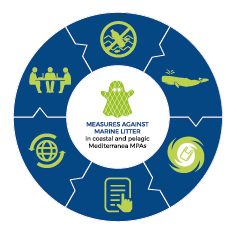 The Plastic Busters Initiative and all the projects under its umbrella have one overall goal: effectively tackle the issue of marine litter throughout the Mediterranean.
The Plastic Busters Initiative and all the projects under its umbrella have one overall goal: effectively tackle the issue of marine litter throughout the Mediterranean.
The Initiative aims to directly supports the implementation of the /MAP Regional Plan on Marine Litter Management in the Mediterranean, also contributing to the global Honolulu Strategy for the prevention and management of Marine Debris. The Initiative is also in line with the recommendations of the UfM Ministerial Meeting on Environment and Climate Change (May 2014), the UfM Ministerial on Blue Economy (November 2015) and the European Union’s Marine Strategy Framework Directive (May 2017), especially the Descriptor 10 (D10) of the latter “Properties and quantities of marine litter do not cause harm to the coastal and marine environment”.
WHAT ACTIONS TOWARDS ACHIEVING THIS GOAL?
To tackle the serious threat that marine litter poses in the Mediterranean area, the Plastic Busters Initiative addresses the whole management cycle of marine litter waste, from data collection to policy reforms.
PLASTIC BUSTERS INITIATIVE
Tackling the whole management cycle of marine litter in the Mediterranean.
DATA COLLECTION & MONITORING
Addressing data needs and gaps on trends and impacts of marine litter by developing a harmonised monitoring strategy.
MITIGATION & PREVENTION
Preventing and reducing marine litter through the implementation of concrete and specific no-regret measures in pilot areas, as often as possible through joint activities with other stakeholders such as fishing communities, etc.
TRANSNATIONAL COOPERATION
Contributing to the establishment of cooperation with other relevant initiatives/projects implemented in the Mediterranean.
POLICY RECOMMENDATIONS
Elaborating of recommendations to facilitate effective policymaking at regional, national, local levels with regards to the reduction of marine litter in the Mediterranean Sea.
AWARENESS RAISING
Increasing awareness among the citizens and institutions using the projects’ findings and information.




